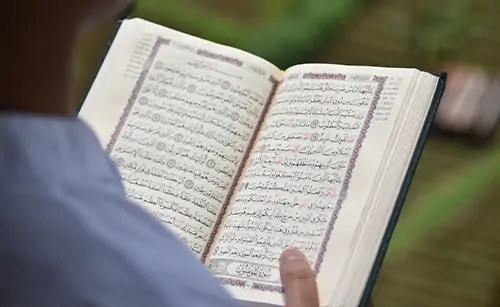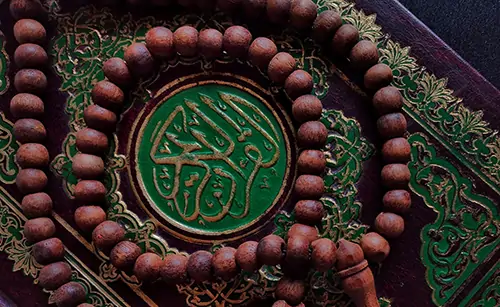Purity of the Soul: A Study of the Importance of Wudu in Islam

Imagine waking up in the morning with a sense of renewal and vitality. Your spirit is up, your mind is clear, and you are prepared to take on the day. This is the importance of wudu, a straightforward but profound Islamic ceremonial purifying practice.
Wudu is washing specified body parts in a specific order with water in preparation for prayer. Before offering any prayer, it is a required act of worship for all Muslims, and it is also advised at many other times, such as before visiting the mosque, reading the Quran, and going to bed.
The first step in wudu is to wash the hands and then rinse the mouth and nose. Next, you must wash your face, followed by the right and left arms up to the elbows. Finally, Wet your hands and wash the head, making sure to clean behind the ears and the back of your neck. and wash the feet up to the ankles.
Wudu is more than just a ceremonial cleaning ritual. It is also a spiritual practice that aids soul cleansing and prepares the worshipper to pray. In this article, we will tell you about the importance of wudu and everything you need to know about it.
The Obligatory Acts (Fard) of Wudu in Islam:
- Washing the Face – This includes rinsing the mouth and nose, covering the entire face from the forehead to the chin and from ear to ear.
- Washing the Arms up to the Elbows – Both arms, from the fingertips to the elbows, should be washed, including the elbows.
- Wiping the Head – Using wet hands, wipe over the entire head once.
- Washing the Feet up to the Ankles – Each foot should be washed, including the ankles.
Completing these steps properly ensures the Wudu is valid, making a person ready for prayer. If you’d like to learn more about how to make wudu or how to perform namaz accurately, join Awwal Quran today and start your journey!
Sunnahs of Wudu (Ablution)
- Begin with Bismillah: Start by saying Bismillah (In the name of Allah) before beginning wudu.
- Use a Moderate Amount of Water: The Prophet (PBUH) would use water sparingly, even when it was plentiful.
- Cleaning the Hands: Wash both hands up to the wrists three times before beginning the rest of the wudu.
- Use of Miswak: Using a miswak (tooth-stick) to clean the teeth before or during wudu is highly recommended.
- Rinsing the Mouth and Nose: Gargling and sniffing water into the nose and blowing it out three times helps ensure thorough cleansing.
- Run Fingers Through the Beard: If you have a beard, it is a Sunnah to run wet fingers through it.
- Wipe the Ears: After wiping the head, use the same water to wipe the inner and outer parts of both ears.
- Perform Wudu in Sequence: Follow the sequence prescribed by the Prophet (PBUH), washing each body part in the recommended order.
- Wash Each Part Three Times: Wash each part (hands, mouth, face, arms, and feet) three times, unless instructed otherwise.
- Conclude with Shahada and Dua: After completing wudu, it is Sunnah to recite Ashhadu an la ilaha illallah wa ashhadu anna Muhammadan abduhu wa rasuluhu. (I bear witness that there is no deity but Allah, and I bear witness that Muhammad is His servant and messenger) and the Dua: Allahumma aj’alni min al-tawwabeen waj’alni min al-mutatah hireen. (O Allah, make me among those who seek repentance and those who are purified).
What Is Wudu in Islam?
Wudu is a very spiritual act and serves as a gateway to the spiritual realm. It is not just a physical action, but it creates a connection between the believer and Allah, and it helps purify the believer's soul. The holy prophet (PBUH) emphasizes the importance of the wudu in Islam.
We want to quote the Hadith of the Prophet (PBUH) so you can understand how important wudu is in Islam.
"When a Muslim performs Wudu and washes his face, all his sins committed with his eyes are washed away. Moreover, When he washes his hands, all his sins committed with his hands are washed away. Lastly, When he washes his feet, all his sins committed with his feet are washed away, until he emerges pure and sinless from his ablution."
This Hadith is an example of how Wudu can transform by purifying the body and soul. A believer cleanses their sins with each Wudu step, which renews their spirituality.
Spiritual Importance of Wudu

Wudu is an action of obedience to Allah from the believer furthermore, it is also a source of your soul's purification and spiritual cleanliness.
Wudu requires believers to do certain action that promotes mindfulness and spiritual awareness. You can say it is a practical means to connect with Allah, and in addition to that we want to quote another Hadith of the Prophet (PBUH)
"The key to the prayer is cleanliness, its entrance is by saying 'Allahu Akbar,' and its exit is through the 'Salam."
This Hadith underscores the paramount significance of Wudu (ablution) in prayer, highlighting that a devout Muslim's meticulous observance of Wudu is essential for attaining the utmost spiritual connection with Allah."
Spiritual Benefits of Wudu in Islam
Wudu (ablution) is not just a physical purification but also holds deep spiritual benefits of Wudu in Islam. It clean a believer from sins and prepares them for Namaz, increse their closeness to Allah. The benefits of Wudu in Islam include protection from evil, physical cleanliness and attaining inner peace. The Prophet Muhammad SAWW emphasized the importance of Wudu, as mentioned in many benefit of Wudu hadith highlighting how it washes away sin and grants entry into Paradise. Performing Wudu regularly ensure spiritual purity, making it an essential act of worship for all Muslim.
Wudu as a Shield Against Sin

Wudu serves as a shield, guarding the believer against sin's temptations and advancing righteousness. A Hadith of the prophet (PBUH) talks about how the wudu protects the believer from sins. We'll quote that below:
"When a believer performs Wudu and washes his face, the angels cleanse his face, and every sin he has seen or committed with his eyes is washed away with the last drop of water. Then he washes his hands, the angels cleanse his hands, and every sin he has touched or committed with his hands is washed away with the last drop of water. After that When he washes his feet, the angels cleanse his feet, and every sin he has walked to or committed with his feet is washed away with the last drop of water."
This Hadith emphasizes that Wudu is a way to ask for forgiveness and protection from sins in addition to cleansing the body. It is an effective tool for spiritual development and self-purification.
Renewal of Intention
Wudu is a reminder five times a day for a Muslim about his commitment to Allah. It allows the believers to renew their intentions and strengthen their connection with Allah. Through Wudu, Muslims renew their intention to submit to Allah's will and live a life of righteousness. It is a moment of self-reflection and self-purification, reminding the believer of their ultimate purpose.
Top Benefits of Wudu in Islam (According to Hadith)
1-Wudu Washes Away Sins
The famous hadith states:
“When a Muslim performs Wudu… his sins depart with the water.”
— Sahih Muslim 244"
2-Wudu Becomes Light on the Day of Judgment
The Prophet ﷺ said:
“My Ummah will come with bright faces, hands, and feet due to Wudu.”
— Bukhari
3-Wudu Protects the Believer Spiritually
Remaining in a state of Wudu keeps a person under Allah’s protection, shielding against whispered temptations.
4-Wudu Brings Mental Peace and Calmness
Cold water refreshes the mind, reduces stress, and improves emotional balance—helping the believer remain focused during prayer.
5-Wudu Opens the Gates of Jannah
If a person performs Wudu perfectly and recites the dua afterward:
“All eight gates of Paradise will be opened for him.”
— Sahih Muslim 234

The Spiritual Importance of Ablution and the Significance of Wudu in Islam
Wudu, or ablution, holds great importance in Islam as it is a prerequisite for performing Namaz and other acts of worship. The process of wudu cleanses not only the body but also the soul, preparing a Muslim for direct communication with Allah. The importance of ablution is highlighted in the Quran, where purity is emphasized as a necessary state for prayer. By performing wudu regularly, Muslims are reminded of the need for both spiritual and physical cleanliness.
The Benefits of Ablution and its Role in Spirituality
The benefits of wudu go beyond cleanliness, offering physical, emotional, and spiritual advantages. The simple act of washing one’s face, hands, and feet refreshes the body and mind, creating a moment of mindfulness and reflection. The significance of wudu lies in its ability to instill a sense of discipline, humility, and awareness. The importance of wudu also extends to maintaining personal hygiene, which is highly valued in Islam. By incorporating ablution into daily life, Muslims are better able to focus on their worship and strengthen their connection with Allah.
Wudu, or ablution, holds immense importance in Islam. It serves as a means of purification and prepares the soul and body for prayer, fostering a deeper connection with Allah. One key reason why wudu is important lies in its role as a physical and spiritual cleanse, ridding a person of impurities before engaging in worship. Additionally, the benefits of wudu extend to improved physical hygiene and mental clarity, which are essential for focus during prayer.
According to several hadiths on the importance of wudu, the Prophet Muhammad (PBUH) emphasized how ablution purifies sins from one’s body, adding immense value to daily worship. The importance of wudu in Islam is underscored by its presence in each prayer ritual. Moreover, these regular acts of ablution promote discipline, mindfulness, and spiritual rejuvenation.
Why Do Muslims Perform Wudu?
Muslims perform Wudu (ablution) to purify themselves physically and spiritually before acts of worship, especially Salah (prayer). It is a ritual cleansing that involves washing specific parts of the body — hands, mouth, nose, face, arms, head, ears, and feet — as commanded in the Quran (Surah Al-Ma’idah 5:6).
Wudu symbolizes cleanliness, discipline, and readiness to stand before Allah. It also helps a person shift their mindset from worldly matters to spiritual focus.
Importance of Wudu (Ablution) in Islam
Wudu (ablution) is an essential purification ritual in Islam that prepares a person for Namaz and worship. It is a means of both physical and spiritual cleanliness ensuring that a believer stands before Allah in a pure state. Wudu not only removes physical impurities but also serves as a way to attain Allah’s blessings and protection.
Three Hadith About the Importance of Wudu:
Sins Are Washed Away Through Wudu
- The Prophet ﷺ said:
"When a Muslim or a believer washes his face (in ablution), every sin he committed with his eyes is washed away from his face with water; when he washes his hands, every sin they committed is washed away from his hands with water; and when he washes his feet, every sin towards which his feet walked is washed away with water, until he emerges pure from sins."
(Sahih Muslim, 244)
Wudu as a Means of Recognition on the Day of Judgment
- The Prophet ﷺ said:
"Indeed, my followers will be called on the Day of Judgment with bright faces, hands, and feet due to the traces of Wudu. So, whoever can increase the brightness, let him do so."
(Sahih al-Bukhari, 136, Sahih Muslim, 246)

Wudu Opens the Doors of Jannah
- The Prophet ﷺ said:
"Whoever performs Wudu properly and then says: ‘Ashhadu an la ilaha illa Allah, wahdahu la sharika lahu, wa ashhadu anna Muhammadan abduhu wa rasooluhu’ (I bear witness that there is no god but Allah, alone without partner, and I bear witness that Muhammad is His servant and Messenger), all eight gates of Paradise will be opened for him, and he may enter through whichever he wishes."
(Sahih Muslim, 234)
Benefits of Maintaining Wudu and the Value of Ablution Water
Staying in a state of wudu throughout the day carries immense spiritual and practical benefits. The Prophet ﷺ encouraged believers to remain in a state of purity, as it elevates the soul and strengthens the connection with Allah. The benefits of maintaining wudu include increased focus in prayer, spiritual tranquility, and continuous readiness for acts of worship. Even outside Salah, being in a state of Islamic ablution brings blessings and protection from negative influences.
Moreover, ablution water itself is considered pure and purifying. Scholars mention that the drops that fall from one’s body during wudhu wash away sins, as mentioned in the Hadith:
“When a Muslim washes his face, every sin which he committed with his eyes will be washed away with the water… when he washes his hands and feet, his sins will fall away with the water.”
— Sahih Muslim 244
Thus, maintaining wudu is not just a prerequisite for prayer; it is a continuous act of worship and purification that benefits the believer both in this world and the Hereafter.
Conclusion
In Islam, wudu (ablution) is an important tool for spiritual purification and a pre-prayer practice. It purifies the soul and body, making forgiving sins easier and enhancing one's ties to Allah. Muslims partake in a ritual known as Wudu, which promotes mindfulness, refreshes their intentions, and serves as a defense against sin.
It serves as a reminder of the importance of maintaining spiritual purity and pursuing righteousness. Muslims purify their souls through wudu, one ablution at a time, on the road to enlightenment and a closer relationship with Allah. We hope that this article was helpful for you and serves your needs.
FAQ's
When do we need to perform Wudu?
The Holy Prophet asked to remain in the state of wudu throughout the day. Moreover, it is obligatory to do wudu before we going to offer namaz.
What is the purity of the soul in Islam?
Soul purification" deals with the heart. Without a relationship with their Lord, hearts cannot fulfill their desires. They cannot communicate with their Lord unless they are "pure," as Allah is Pure and will only accept that which is Pure. The closer a heart is to its Lord, the more it will appreciate being with Him.
What are the powers of Wudu?
There are three powers of the Wudu: spiritual purification, physical purification, and preparation of the prayers. We have talked about all these things in our article.
Is Wudu an act of worship?
People think that you can perform wudu only for prayer, but actually, wudu is not just an act of cleanliness but also an act of worship itself.
What are the benefits of Wudu?
Wudu purifies both the body and soul, enhances spiritual focus during prayers, and refreshes the mind. If you want to learn how to perform Wudu, you can join Awwal Quran.
What are the four pillars of wudu?
Four pillars of the wudu are washing the face, washing the arms up to the elbows, wiping the head, and washing the feet up to the ankles. These pillars are essential to performing wudu and prayer afterward.














